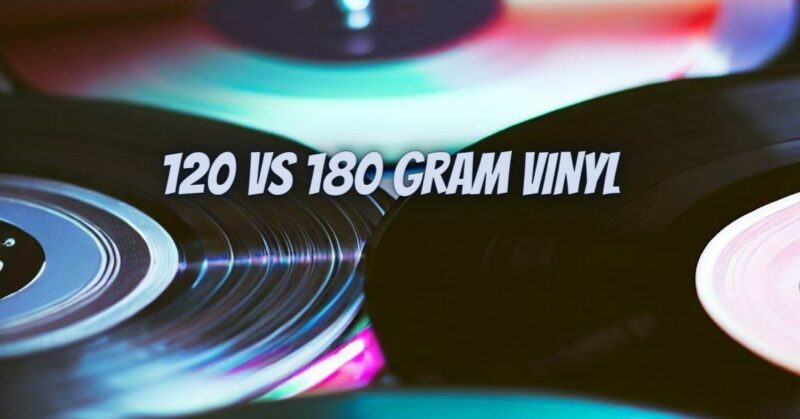120g and 180g vinyl are two different weights of vinyl records. 120g vinyl is the standard weight for vinyl records, while 180g vinyl is considered to be a heavier weight.
Sound quality
One of the main differences between 120g and 180g vinyl is the sound quality. 180g vinyl is generally considered to offer better sound quality than 120g vinyl. This is because the thicker and heavier PVC material used to press 180g vinyl records helps to reduce surface noise and distortion. Additionally, the increased weight of 180g vinyl records can help to improve the tracking of the stylus, which can lead to more accurate sound reproduction.
However, it is important to note that the sound quality of a vinyl record is not only determined by the weight of the record. The quality of the recording, the condition of the record, and the playback system used to play the record can also have a significant impact on the sound quality.
Warping
Another difference between 120g and 180g vinyl is the likelihood of warping. 120g vinyl is more likely to warp than 180g vinyl. This is because the thinner and lighter PVC material used to press 120g vinyl records is more susceptible to warping. Warping can occur when vinyl records are exposed to extreme heat or humidity. When a vinyl record warps, it can cause the stylus to skip and drag, which can lead to distorted sound.
Durability
180g vinyl is also more durable than 120g vinyl. This is because the thicker and heavier PVC material used to press 180g vinyl records is less susceptible to scratches and cracks. Scratches and cracks in vinyl records can cause pops and clicks in the audio playback.
Price
One of the main disadvantages of 180g vinyl is that it is typically more expensive than 120g vinyl. This is because the thicker and heavier PVC material used to press 180g vinyl records is more expensive. Additionally, 180g vinyl records are often pressed in smaller quantities than 120g vinyl records, which can also drive up the price.
Availability
Another disadvantage of 180g vinyl is that it may not be as widely available as 120g vinyl. This is because 180g vinyl records are often pressed in smaller quantities than 120g vinyl records. Additionally, 180g vinyl records may not be available at all stores that sell vinyl records.
Overall, 180g vinyl offers a number of advantages over 120g vinyl, such as improved sound quality, reduced warping, and increased durability. However, it is important to weigh the pros and cons before deciding whether or not to purchase 180g vinyl records. 180g vinyl is typically more expensive and less widely available than 120g vinyl.
If you are serious about listening to vinyl records and you have the budget, then 180g vinyl can be a good option. However, if you are on a tight budget or you are not sure if you will appreciate the difference in sound quality, then 120g vinyl is a good and affordable alternative.
It is also important to note that not all turntables are compatible with 180g vinyl. It is important to check the specifications of your turntable before purchasing 180g vinyl records. Some turntables may not be able to handle the extra weight of 180g vinyl records, and this could potentially damage your turntable.


